Tokyo Story (2015) Directed by Yasujiro Ozu
An elderly couple visit their children in far off Tokyo where two of their five children live, an adult son and an adult daughter, as well as their daughter-in-law who is a war widow. Neither of their children, a busy physician and a self-centred, sharp-tongued owner of a hairdressing salon, has much time for their parents whose visit is perceived more as an inconvenience than anything else. It is left to Noriko, the daughter-in-law, to provide the old couple with the kindness, respect and love that they deserve. The movie is about how parents can come to be perceived as a burden and how children grow apart from them in ways that can be disappointing and hurtful, but inevitable, too. While these concerns constitute the primary focus of the movie, a lot of other important themes get addressed: the certainty of change; the importance of decency; the value of restraint; the deep currents of feeling that lie within; and, perhaps most importantly, the need to learn when to let go. Along with
Pather Panchali,
Tokyo Story was among the first works that I came across that really demonstrated to me that the common experience of everyday people could be transformed into art if an artist was skilled enough to do so and that people from anywhere share a lot more in common with one another than our differences might at first suggest. It took a while for that last one to sink in, though.
In terms of film, one might think that exposure to Italian neo-realism might have accomplished at least some of the above , but it didn't. Upon my first exposure to it, neo-realism seemed hopelessly dated to me (I was madly in love with French New Wave which was still going strong). But I think I had a legitimate gripe, too. The trappings of neo-realism impressed me--the amateur actors, the cheap, mobile cameras, the use of available lighting, and so forth--but with the exception of
The Bicycle Thief and some of Visconti's earliest works, the stories these movies told seemed as melodramatic and artificial as many of the conventional Italian films that had come before them. The new style was definitely on the right track, but, in too many instances, content hadn't yet caught up to those stylistic breakthroughs.
Ozu had the right realistic content--all his films, including the silent ones that I have seen, focus believably on middle class life in Japan in a very convincing way--but his style wasn't "basic" by any means. In fact, his style could hardly be more contrived. But it worked perfectly. Most obviously, he never (or virtually never--maybe once every two movies) moves his camera which is always stationary, virtually nailed to whatever surface it is resting upon. Movement may occur in the frame as when we watch the streets of Tokyo pass by from the vantage point of a bus. But in that bus, the camera is placed in a static position just looking out a window. Yet by shifting angles and by careful sequential placement of his stationary camera, Ozu is able to create a marvelous sense of movement when called upon to do so.
He is also a master of controlling what is within the frame of his shot. I mentioned in a previous review how artfully he uses the frame (in this instance, the interiors of Japanese homes) to direct his audience's eye to exactly where he wants us to look. Of course, I noticed this again when I re-watched
Tokyo Story. But this time around, my mind was full of rectangles. In my childhood, kid's magazines sometimes had pages with drawings on them and the child was supposed to count, say, the number of triangles that they could find on that page. I always missed at least a couple of them. Watching Ozu's interiors this time, I marvelled at all the rectangles--there are so many rectangles in some of those shots that it would be impossible to count them, the number would be astronomical. But Ozu knows how to use them to direct our eyes to where he wants them to go. The content may be mundane, but Ozu contrasts it by always giving us something that both serves a useful purpose cinematically and delights the eye simultaneously. In a way, that's a very smart move.
Such simple stories, such contrived style--and, yet, it works. Ozu speaks to universal concerns more directly and more persuasively than just about any other artist from anywhere with similar intent.
subtitles


 ). How the hell have you seen so many movies? Just curious.
). How the hell have you seen so many movies? Just curious.). How the hell have you seen so many movies? Just curious.
). How the hell have you seen so many movies? Just curious.






